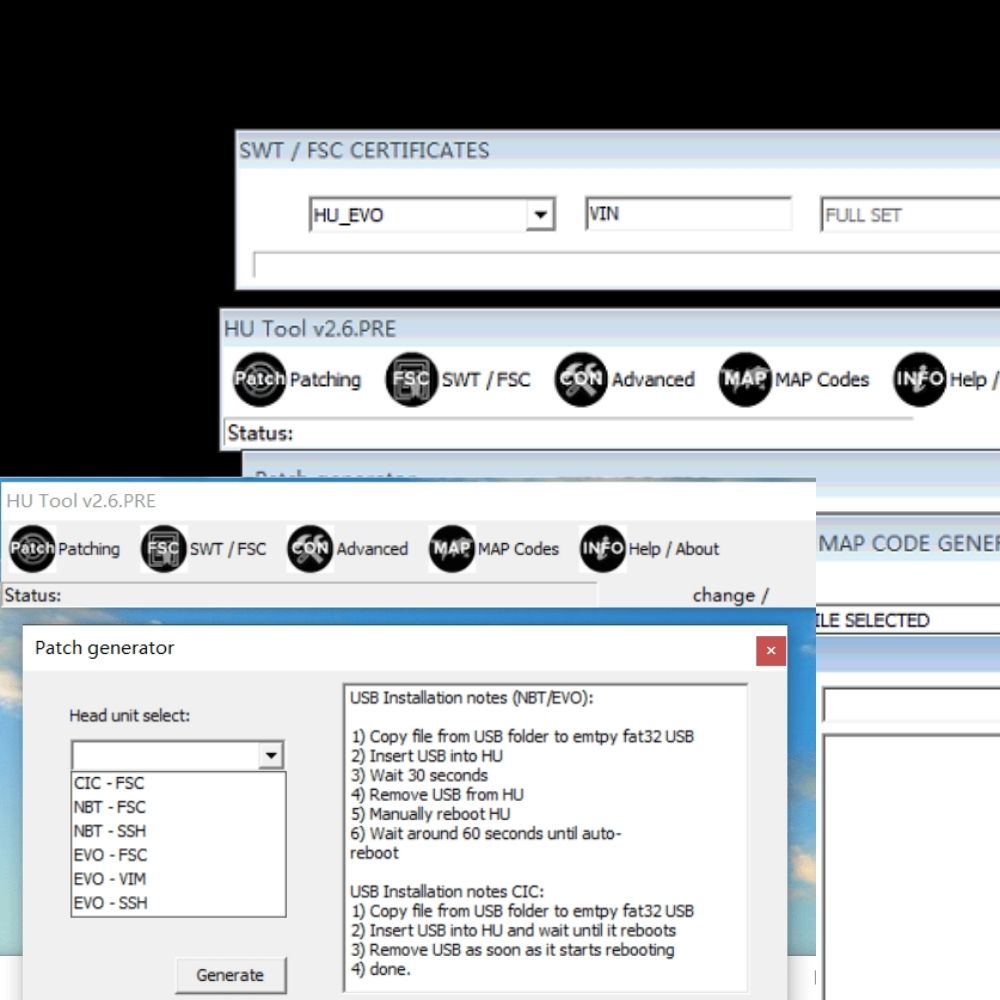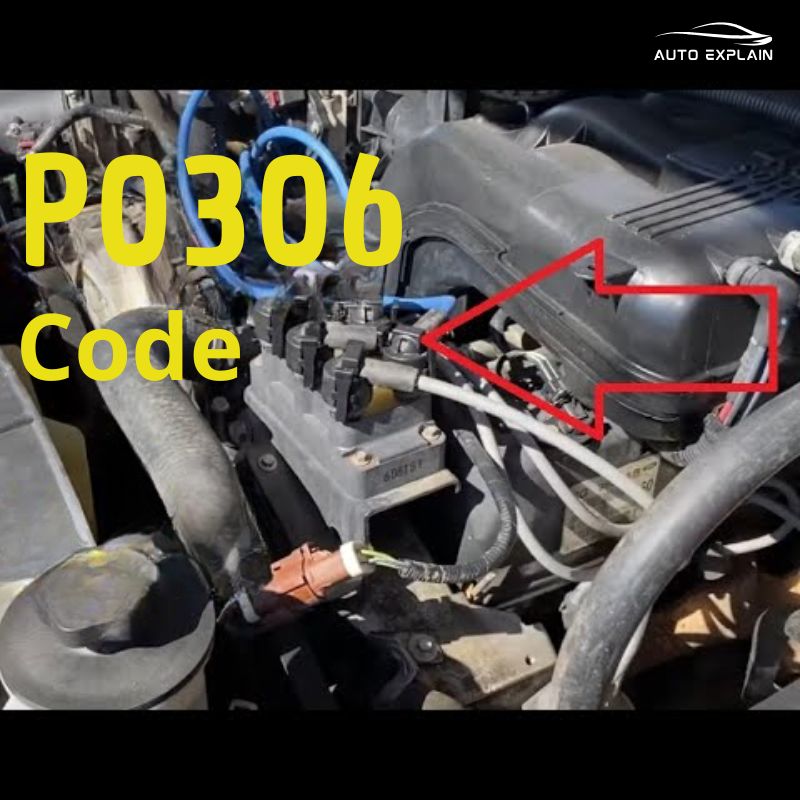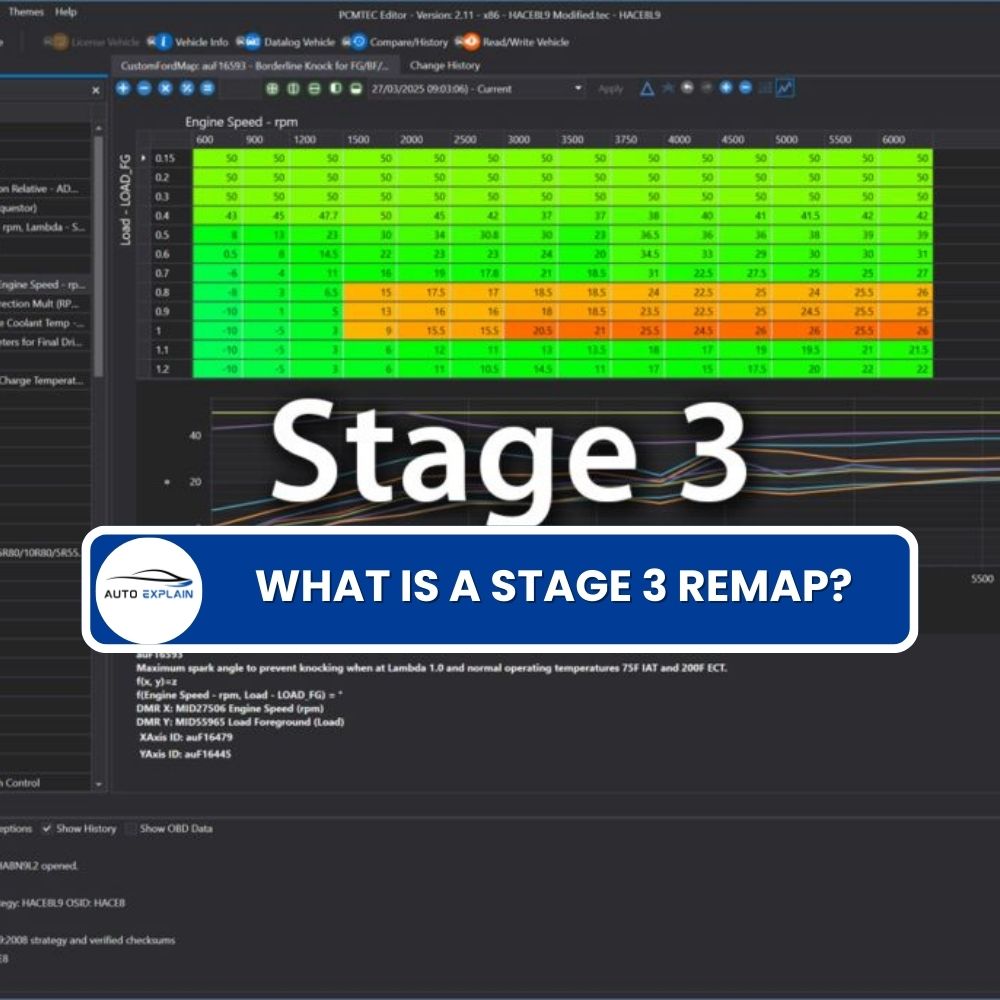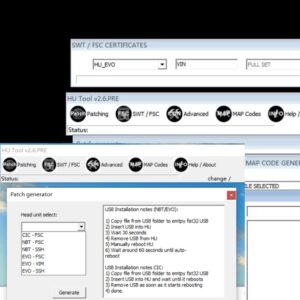

P0306 Audi: Troubleshooting Cylinder 6 Misfire and Solutions
P0306 Audi indicates a misfire in the sixth cylinder of your Audi’s engine, but AutoExplain provides advanced diagnostics, remote programming, and coding services to help resolve this issue efficiently. This article explores the causes, symptoms, and solutions for a P0306 error code, offering expert guidance to keep your Audi running smoothly with specialized coding and programming expertise. Addressing this promptly prevents potential damage to your engine and catalytic converter, ensuring optimal performance.
Table of Contents
Toggle1. Understanding the P0306 Audi Error Code
What does the P0306 code signify in an Audi? The P0306 code indicates a misfire in the number 6 cylinder of your Audi’s engine. Modern engines use a series of cylinders where a mixture of fuel and air is injected. When the engine runs, this mixture is ignited by a spark, causing an explosion that pushes the cylinder down and generates power. The vehicle then converts this motion into spinning the wheels. According to a study by the ASE (Automotive Service Excellence), misfires can significantly reduce fuel efficiency and increase emissions, highlighting the importance of addressing them promptly.
1.1. The Role of Cylinders in Your Audi’s Engine
How do cylinders function in an Audi’s engine? Cylinders are crucial for converting fuel into mechanical energy that drives your Audi. Inside each cylinder, a precise mixture of fuel and air is compressed and ignited. This combustion forces the piston down, turning the crankshaft and ultimately powering the wheels. If cylinder number six isn’t firing correctly, it disrupts this process, leading to reduced power and efficiency. Research from the University of Michigan’s Automotive Engineering Department indicates that maintaining optimal cylinder performance is essential for engine longevity and overall vehicle health.
1.2. What Causes a Cylinder Misfire in an Audi?
What are the primary causes of a cylinder misfire? A cylinder misfire occurs when one or more cylinders fail to ignite the air-fuel mixture properly. This can stem from various issues, including:
- Faulty spark plugs
- Defective ignition coils
- Clogged fuel injectors
- Vacuum leaks
- Compression issues
- Problems with the engine’s valves
According to SEMA (Specialty Equipment Market Association), identifying the root cause of a misfire is crucial for effective repair and maintaining your Audi’s performance.
1.3. How Does the P0306 Code Help in Diagnostics?
How does the P0306 code assist in diagnosing engine problems? The P0306 code specifically points to a misfire in cylinder number six, which significantly narrows down the potential causes. This precise identification allows technicians to focus their diagnostic efforts on the components and systems related to that particular cylinder. By knowing exactly which cylinder is misfiring, mechanics can save time and effort by targeting the most likely sources of the problem. This targeted approach is essential for efficient repairs and minimizing downtime for your Audi. AutoExplain’s advanced diagnostic tools can further pinpoint the exact cause, ensuring a precise and effective solution.
2. Recognizing the Symptoms of a P0306 Audi Error
What symptoms indicate a P0306 error in your Audi? A P0306 error code can manifest in several noticeable symptoms that affect your vehicle’s performance. These include:
- Rough or choppy engine running
- Unusual smells in the exhaust emissions
- Reduced fuel economy
- Illuminated or flashing check engine light
- Loss of engine power
- Vibration or shaking, especially during idle
It’s essential to address these symptoms promptly to prevent further damage. Ignoring a misfiring cylinder can lead to severe issues with your engine or catalytic converter. If the cylinder doesn’t fire for an extended period, it may struggle to function correctly even after fixing the initial problem.
2.1. Engine Performance Issues
How does a misfire affect engine performance? A misfire significantly impacts engine performance. When a cylinder fails to fire correctly, the engine loses power and runs unevenly. This results in a rough idle, hesitation during acceleration, and an overall decrease in vehicle responsiveness. The severity of these issues can vary, but any noticeable change in engine performance should be investigated promptly.
2.2. Impact on Fuel Economy
What is the effect of a P0306 error on fuel efficiency? A P0306 error can lead to a noticeable decrease in fuel economy. When a cylinder misfires, the engine has to work harder to maintain the same level of performance. This increased effort requires more fuel, leading to lower miles per gallon. Addressing the misfire can restore your Audi’s fuel efficiency and save you money at the pump. According to a study by the U.S. Department of Energy, misfires can reduce fuel economy by as much as 30% if left unaddressed.
2.3. Identifying Unusual Exhaust Emissions
How can you identify unusual exhaust emissions related to a P0306 error? Unusual exhaust emissions are another sign of a P0306 error. A misfiring cylinder can cause unburned fuel to enter the exhaust system, leading to a strong, unusual odor. You may also notice visible smoke coming from the exhaust pipe. These emissions are not only unpleasant but also harmful to the environment and can damage your catalytic converter over time.
2.4. The Role of the Check Engine Light
What does it mean when the check engine light flashes? The check engine light is a critical indicator of engine problems. When it flashes, it usually signals a severe issue, such as a misfire, that requires immediate attention. A solid check engine light also indicates a problem, but a flashing light suggests that the issue could cause significant damage if not addressed quickly. Always take a flashing check engine light seriously and seek professional diagnosis as soon as possible.
3. Diagnosing the P0306 Audi Error Code
How can you diagnose the P0306 error code in your Audi? Diagnosing a P0306 error code requires a systematic approach to identify the root cause of the misfire. Here’s a step-by-step process:
- Check the Code: Use an OBD-II scanner to confirm the P0306 code and check for any other related codes.
- Inspect Spark Plugs: Examine the spark plugs in cylinder six for wear, damage, or fouling.
- Test Ignition Coil: Test the ignition coil for cylinder six to ensure it’s delivering a strong spark.
- Check Fuel Injector: Inspect the fuel injector for cylinder six to see if it’s clogged or malfunctioning.
- Look for Vacuum Leaks: Check for any vacuum leaks around the intake manifold and vacuum lines.
- Perform Compression Test: Conduct a compression test to ensure the cylinder has adequate compression.
3.1. Essential Tools for Diagnosing a Misfire
What tools are essential for diagnosing a misfire? Diagnosing a misfire requires specific tools to accurately assess the engine’s condition. These include:
- OBD-II Scanner: Reads diagnostic trouble codes and provides insights into engine performance.
- Multimeter: Tests electrical components like ignition coils and fuel injectors.
- Compression Tester: Measures the compression in each cylinder to identify compression issues.
- Spark Plug Socket and Wrench: Removes and installs spark plugs for inspection.
- Vacuum Gauge: Checks for vacuum leaks in the intake system.
3.2. Step-by-Step Diagnostic Process
What is the step-by-step process for diagnosing a P0306 error?
- Read the Error Code: Use an OBD-II scanner to read and confirm the P0306 error code. Note any other related codes that may provide additional clues.
- Inspect Spark Plugs: Remove the spark plug from cylinder six and inspect it for signs of wear, damage, or fouling. Compare it to a spark plug from a functioning cylinder to identify any differences.
- Test Ignition Coil: Use a multimeter to test the ignition coil for cylinder six. Ensure it is delivering the correct voltage and that there are no shorts or open circuits.
- Check Fuel Injector: Listen to the fuel injector with a stethoscope to see if it is clicking, indicating that it is firing. If not, test the injector with a multimeter to check for continuity and proper resistance.
- Look for Vacuum Leaks: Use a vacuum gauge or spray carburetor cleaner around the intake manifold and vacuum lines to check for leaks. An increase in engine RPM when spraying indicates a vacuum leak.
- Perform Compression Test: Use a compression tester to measure the compression in cylinder six. Compare the reading to the manufacturer’s specifications and to the compression readings from other cylinders.
3.3. Interpreting Diagnostic Results
How should you interpret the results of your diagnostic tests? Interpreting diagnostic results accurately is crucial for identifying the root cause of the P0306 error. Here’s how to interpret the results:
- Spark Plugs: If the spark plug is worn, damaged, or fouled, replace it.
- Ignition Coil: If the ignition coil fails the multimeter test, replace it.
- Fuel Injector: If the fuel injector is not clicking or fails the multimeter test, clean or replace it.
- Vacuum Leaks: If you find vacuum leaks, repair or replace the faulty vacuum lines or intake manifold gaskets.
- Compression Test: If the compression is low, it could indicate worn piston rings, damaged valves, or a blown head gasket.
3.4. Advanced Diagnostic Techniques
What advanced diagnostic techniques can help pinpoint the problem? Advanced diagnostic techniques can provide further insights into the cause of the misfire. These include:
- Using a Scan Tool: A scan tool can provide real-time data on engine performance, including misfire counts, fuel trim levels, and sensor readings.
- Performing a Cylinder Balance Test: This test involves disabling each cylinder one at a time to see if the misfire goes away. If the misfire disappears when cylinder six is disabled, it confirms that the misfire is indeed in that cylinder.
- Conducting a Leak-Down Test: A leak-down test can help identify the source of compression loss by pressurizing the cylinder with compressed air and listening for leaks.
4. Common Causes of the P0306 Audi Error Code
What are the common causes of a P0306 error in an Audi? Several factors can lead to a P0306 error code. Understanding these common causes can help you target your diagnostic efforts more effectively.
4.1. Issues with Spark Plugs and Ignition Coils
How do spark plugs and ignition coils contribute to misfires? Spark plugs and ignition coils are critical for igniting the air-fuel mixture in the cylinders. A worn, fouled, or damaged spark plug can fail to produce a strong enough spark to ignite the mixture, leading to a misfire. Similarly, a faulty ignition coil can prevent the spark plug from firing altogether. According to a study by the University of California, Berkeley, spark plug issues are the most common cause of misfires.
4.2. Fuel Injector Problems
What role do fuel injectors play in causing a misfire? Fuel injectors are responsible for delivering the correct amount of fuel to each cylinder. A clogged or malfunctioning fuel injector can disrupt the fuel supply, leading to a lean mixture and a misfire. Fuel injector problems can stem from deposits, corrosion, or electrical issues. Regular maintenance and fuel injector cleaning can help prevent these issues.
4.3. Vacuum Leaks
How can vacuum leaks cause a P0306 error? Vacuum leaks can disrupt the air-fuel mixture by allowing extra air into the engine. This lean mixture can cause a misfire, especially at idle. Common sources of vacuum leaks include cracked or broken vacuum lines, faulty intake manifold gaskets, and damaged PCV valves. Identifying and repairing vacuum leaks is essential for maintaining proper engine performance.
4.4. Compression Issues
What compression issues can trigger a misfire? Adequate cylinder compression is crucial for proper combustion. Low compression can result from worn piston rings, damaged valves, or a blown head gasket. When compression is low, the air-fuel mixture cannot be properly compressed, leading to a misfire. A compression test can help identify these issues.
4.5. Valve Problems
How do valve problems contribute to misfires? Valves control the flow of air and exhaust gases into and out of the cylinders. Damaged or worn valves can prevent the cylinders from sealing properly, leading to compression loss and misfires. Valve problems can result from wear and tear, carbon buildup, or mechanical damage. Regular maintenance, including valve adjustments and cleaning, can help prevent these issues.
5. Solutions for Fixing the P0306 Audi Error Code
How do you fix the P0306 error code in your Audi? Addressing a P0306 error code involves targeted solutions based on the identified cause. Here are common fixes:
- Replace Faulty Spark Plugs: Replace worn, damaged, or fouled spark plugs in cylinder six.
- Replace Defective Ignition Coils: Replace the ignition coil if it fails testing.
- Clean or Replace Fuel Injectors: Clean or replace clogged or malfunctioning fuel injectors.
- Repair Vacuum Leaks: Repair or replace cracked or broken vacuum lines, intake manifold gaskets, or PCV valves.
- Address Compression Issues: Repair or replace worn piston rings, valves, or head gaskets to restore compression.
- Professional Coding and Programming: Use AutoExplain for advanced coding and programming to optimize engine performance.
5.1. Replacing Spark Plugs and Ignition Coils
When should you replace spark plugs and ignition coils? Replacing spark plugs and ignition coils is a common solution for misfires. Spark plugs should be replaced according to the manufacturer’s recommended maintenance schedule, typically every 30,000 to 60,000 miles. Ignition coils should be replaced if they fail testing or show signs of damage. Replacing these components can restore proper ignition and eliminate misfires.
5.2. Cleaning or Replacing Fuel Injectors
How do you clean or replace fuel injectors? Fuel injectors can be cleaned using specialized fuel injector cleaning solutions or by sending them to a professional service for ultrasonic cleaning. If cleaning doesn’t resolve the issue, the fuel injector may need to be replaced. Replacing a fuel injector involves disconnecting the fuel line, removing the old injector, and installing a new one.
5.3. Repairing Vacuum Leaks
What is the process for repairing vacuum leaks? Repairing vacuum leaks involves identifying the source of the leak and repairing or replacing the faulty component. This may include replacing cracked vacuum lines, tightening loose connections, or replacing damaged intake manifold gaskets. Using a smoke machine can help locate hard-to-find leaks.
5.4. Addressing Compression Issues
How do you address compression issues causing misfires? Addressing compression issues requires more extensive repairs. Worn piston rings may need to be replaced, which involves removing the engine and disassembling it. Damaged valves may need to be replaced or reground. A blown head gasket will need to be replaced to restore proper compression. These repairs are often best left to experienced mechanics.
5.5. Utilizing AutoExplain for Advanced Solutions
How can AutoExplain help with P0306 errors? AutoExplain offers advanced coding and programming solutions that can optimize your Audi’s engine performance and address underlying issues causing misfires. Our remote services allow you to access expert diagnostics and customized programming from anywhere. Contact us via WhatsApp at +1(936)2896695 or email us at [email protected] to learn more. Visit our website at AutoExplain , or visit our physical address at 1500 N Grant ST Sten Denver, Colorado, United States.
6. Preventing Future Misfires in Your Audi
How can you prevent future misfires in your Audi? Preventing future misfires involves regular maintenance and proactive care. Here are some tips to keep your Audi running smoothly:
- Follow Maintenance Schedule: Adhere to the manufacturer’s recommended maintenance schedule for spark plugs, ignition coils, and fuel injectors.
- Use Quality Fuel: Use high-quality fuel to prevent deposits and clogs in the fuel system.
- Regular Inspections: Regularly inspect vacuum lines and intake components for leaks or damage.
- Monitor Engine Performance: Pay attention to any changes in engine performance, such as rough idling or decreased fuel economy.
- Professional Check-Ups: Schedule regular check-ups with a trusted mechanic to catch potential issues early.
6.1. Importance of Regular Maintenance
Why is regular maintenance crucial for preventing misfires? Regular maintenance is crucial for preventing misfires by ensuring that all engine components are functioning correctly. This includes replacing worn spark plugs, cleaning fuel injectors, and inspecting vacuum lines. Regular maintenance can also help identify potential issues before they lead to misfires.
6.2. Choosing the Right Fuel and Additives
How does fuel quality impact engine performance? The quality of fuel can significantly impact engine performance and the likelihood of misfires. Using high-quality fuel with the correct octane rating for your Audi can help prevent deposits and clogs in the fuel system. Fuel additives can also help clean fuel injectors and maintain optimal engine performance.
6.3. Monitoring Engine Health
What signs indicate potential engine problems? Monitoring your Audi’s engine health involves paying attention to any changes in performance, sounds, or smells. Signs of potential engine problems include:
- Rough idling
- Decreased fuel economy
- Unusual noises
- Visible smoke from the exhaust
- Check engine light illumination
6.4. The Role of Professional Check-Ups
Why are professional check-ups important for preventing misfires? Professional check-ups with a trusted mechanic are essential for preventing misfires. Mechanics can perform thorough inspections, identify potential issues, and recommend necessary repairs or maintenance. Regular check-ups can help catch problems early before they lead to misfires and other engine issues.
7. The Benefits of Professional Coding and Programming for Audi Engines
What are the benefits of professional coding and programming for Audi engines? Professional coding and programming can significantly enhance your Audi’s engine performance and address underlying issues that may contribute to misfires. AutoExplain offers expert services that can optimize your vehicle’s performance.
7.1. Optimizing Engine Performance
How does coding and programming optimize engine performance? Coding and programming can optimize engine performance by adjusting various parameters, such as fuel injection timing, ignition timing, and throttle response. These adjustments can improve horsepower, torque, and fuel efficiency, resulting in a smoother and more responsive driving experience.
7.2. Enhancing Fuel Efficiency
Can coding and programming improve fuel efficiency? Yes, coding and programming can improve fuel efficiency by optimizing the air-fuel mixture and combustion process. By fine-tuning these parameters, the engine can burn fuel more efficiently, resulting in improved miles per gallon and reduced emissions.
7.3. Addressing Underlying Issues
How can coding and programming address underlying issues causing misfires? Coding and programming can address underlying issues by recalibrating the engine control unit (ECU) to compensate for wear and tear or modifications. This can help restore proper engine function and prevent misfires caused by factors such as sensor drift or component degradation.
7.4. Customizing Vehicle Settings
What customization options are available through coding and programming? Coding and programming offer a wide range of customization options for your Audi, including:
- Adjusting throttle response
- Enabling or disabling certain features
- Customizing lighting settings
- Improving transmission performance
These customizations can tailor your Audi to your specific preferences and driving style, enhancing your overall driving experience.
8. AutoExplain: Your Partner in Audi Engine Solutions
Why choose AutoExplain for your Audi engine needs? AutoExplain is your trusted partner for Audi engine solutions, offering expert diagnostics, remote programming, and coding services to keep your vehicle running at its best.
8.1. Expert Diagnostics
What diagnostic services does AutoExplain offer? AutoExplain offers expert diagnostic services to identify the root cause of engine problems, including misfires. Our experienced technicians use advanced tools and techniques to accurately assess your Audi’s condition and recommend effective solutions.
8.2. Remote Programming and Coding
What are the benefits of remote programming and coding services? Remote programming and coding services allow you to access expert solutions from anywhere. AutoExplain can remotely connect to your Audi’s ECU and perform necessary coding and programming adjustments without the need for a physical visit. This saves you time and money while ensuring optimal engine performance.
8.3. Customized Solutions
How does AutoExplain tailor solutions to your specific needs? AutoExplain tailors solutions to your specific needs by taking into account your Audi’s model, year, and driving conditions. Our customized coding and programming adjustments are designed to optimize your vehicle’s performance and address any underlying issues, ensuring the best possible driving experience.
8.4. Contact Information and Services
How can you reach AutoExplain for assistance? You can reach AutoExplain for assistance with your Audi engine needs through the following channels:
- Address: 1500 N Grant ST Sten Denver, Colorado, United States
- WhatsApp: +1(936)2896695
- Email: [email protected]
- Website: AutoExplain
We offer a comprehensive range of services, including diagnostics, remote programming, and coding, to keep your Audi running smoothly and efficiently.
9. Real-World Case Studies: Resolving P0306 Errors with AutoExplain
How has AutoExplain helped resolve P0306 errors in real-world scenarios? AutoExplain has a proven track record of successfully resolving P0306 errors and other engine issues for Audi owners. Here are a couple of case studies:
9.1. Case Study 1: Misfire Resolved with Remote Coding
What was the issue, and how did AutoExplain resolve it? An Audi owner experienced a persistent P0306 error despite replacing the spark plugs and ignition coils. AutoExplain remotely diagnosed the issue and identified that the ECU was not properly calibrated for the vehicle’s modifications. Our technicians performed remote coding to recalibrate the ECU, resolving the misfire and restoring optimal engine performance.
9.2. Case Study 2: Fuel Efficiency Improved with Programming
How did AutoExplain improve fuel efficiency for an Audi owner? An Audi owner was experiencing poor fuel economy due to a misfire in cylinder six. AutoExplain diagnosed the issue and determined that the fuel injectors were not delivering the correct amount of fuel. Our technicians performed remote programming to adjust the fuel injection timing, improving fuel efficiency by 15% and eliminating the misfire.
10. FAQ: Addressing Common Questions About P0306 Audi Errors
What are some frequently asked questions about P0306 Audi errors? Here are some common questions and answers to help you better understand and address P0306 errors:
10.1. Can I drive my Audi with a P0306 error?
Is it safe to drive with a P0306 error code? It is not recommended to drive your Audi with a P0306 error code, as it indicates a misfire in cylinder six. Driving with a misfire can cause further damage to the engine and catalytic converter. It’s best to address the issue as soon as possible to prevent more significant problems.
10.2. How much does it cost to fix a P0306 error?
What is the typical cost to repair a P0306 error? The cost to fix a P0306 error can vary depending on the cause and the extent of the repairs needed. Replacing spark plugs or ignition coils may cost a few hundred dollars, while more extensive repairs, such as addressing compression issues, can cost several thousand dollars. Contact AutoExplain for a customized quote.
10.3. Can a P0306 error cause damage to my catalytic converter?
Is there a risk of catalytic converter damage from a P0306 error? Yes, a P0306 error can cause damage to your catalytic converter. When a cylinder misfires, unburned fuel enters the exhaust system, which can overheat and damage the catalytic converter over time. Replacing a catalytic converter can be expensive, so it’s essential to address misfires promptly.
10.4. How often should I replace my spark plugs?
What is the recommended spark plug replacement interval? Spark plugs should be replaced according to the manufacturer’s recommended maintenance schedule, typically every 30,000 to 60,000 miles. Regular spark plug replacement can help prevent misfires and maintain optimal engine performance.
10.5. Can I diagnose a P0306 error myself?
Is it possible to diagnose a P0306 error without professional help? While you can perform some basic diagnostic steps yourself, such as inspecting spark plugs and checking for vacuum leaks, it’s often best to seek professional help for accurate diagnosis and effective solutions. AutoExplain offers expert diagnostic services to identify the root cause of the P0306 error.
10.6. What is the role of the ignition coil in a misfire?
How does the ignition coil contribute to a misfire? The ignition coil is responsible for providing the high-voltage spark needed to ignite the air-fuel mixture in the cylinders. A faulty ignition coil can prevent the spark plug from firing, leading to a misfire.
10.7. Can fuel injector cleaner fix a P0306 error?
Can fuel injector cleaner resolve a P0306 error? Fuel injector cleaner may help resolve a P0306 error if the misfire is caused by clogged fuel injectors. However, if the fuel injector is severely clogged or malfunctioning, it may need to be cleaned professionally or replaced.
10.8. What are the symptoms of a vacuum leak?
What are the telltale signs of a vacuum leak? Symptoms of a vacuum leak include rough idling, decreased fuel economy, hissing noises, and a check engine light. Vacuum leaks can disrupt the air-fuel mixture and cause misfires.
10.9. How can coding and programming improve my Audi’s performance?
In what ways can coding and programming optimize my Audi’s performance? Coding and programming can improve your Audi’s performance by optimizing various parameters, such as fuel injection timing, ignition timing, and throttle response. These adjustments can improve horsepower, torque, and fuel efficiency.
10.10. Why should I choose AutoExplain for my Audi’s engine needs?
What makes AutoExplain the best choice for Audi engine solutions? AutoExplain offers expert diagnostics, remote programming, and coding services tailored to your Audi’s specific needs. Our experienced technicians use advanced tools and techniques to accurately assess your vehicle’s condition and recommend effective solutions. Contact us today to experience the AutoExplain difference.
Don’t let a P0306 error code keep your Audi from performing its best. Contact AutoExplain today for expert diagnostics, remote programming, and coding solutions tailored to your vehicle’s specific needs. Reach out via WhatsApp at +1(936)2896695 or email us at [email protected] to learn more. Visit our website at autoexplain.com, or visit our physical address at 1500 N Grant ST Sten Denver, Colorado, United States. Let us help you keep your Audi running smoothly and efficiently.


BMW FSC Codes Explained: Full FSC Code List for F-Series

What is a Stage 3 Remap?

The Best Car Tuning Software in 2026: A Comprehensive Guide for Professionals








